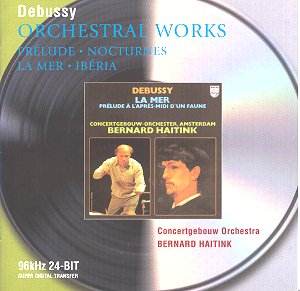All of these recordings are classics of their time
and were among the finest of their day. Their appeal has dimmed little
in the intervening decades.
The Prélude á l'après-midi
d'un faune is the ideal way to begin the disc. This is a truly sensuous,
ravishing performance. The wind are consistently excellent and the ending
is delicately perfumed. The close melds perfectly into the first Nocturne,
‘Nuages’ (‘Clouds’). The recording quality of the Nocturnes is,
in particular, superb: the distancing of the final female chorus in
the closing movement, ‘Sirènes’ is nigh on perfect, these particular
sirens being shrouded in mystery. The middle, contrasting ‘Fêtes’
casts just a shadow of doubt as the trumpets appear decidedly more festive
than the rest of the orchestra.
La mer, perhaps second only in popularity to
the Prélude, is given a thought-provoking, stimulating
performance which at all times sounds perfectly Debussian. The ‘Jeux
de vagues’ (the second movement) is intriguing in that Haitink points
out its prophetic side: in its elusive, elliptical language it is a
clear close blood-relation to the late Jeux. The movement vapourises
into nothing at the end, leaving the Dialogue du vent et de la mer
to refute any suggestion that Haitink is always a dull conductor.
Perhaps he is not, however, suited to the Franco-Mediterranean
exuberance of Ibéria. Admittedly, the accents of ‘Par
les rues et par les chemins’ can sound a bit forced (this also goes
for the solo trumpet at the end). The final two movements all but erase
memories of this: ‘Les parfums de la nuit’ is exquisitely presented
and features an outstanding, gentle oboe, while there is a beautiful
feeling of coming into focus to the dance rhythms of ‘Le matin d’un
jour de fête’.
All in all, outstanding. Haitink’s Debussy is as unique
as, in its different way, Karajan’s. At the price, this very well-filled
and carefully programmed disc provides performances which can act as
any collection’s Debussian reference points.
Colin Clarke

![]() Concertgebouw Orchestra/Bernard
Haitink
Concertgebouw Orchestra/Bernard
Haitink ![]() PHILIPS 50 Great Recordings
464 697-2 [78.43]
PHILIPS 50 Great Recordings
464 697-2 [78.43]